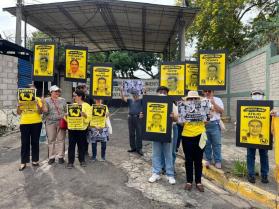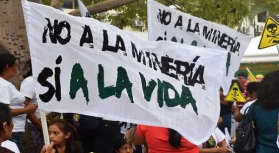Informal Vendors Protest CAFTA Implementation, Police Respond with Violence
As immigrants across the United States took to the streets in record numbers over the weekend and on Monday demanding immigration reform in the U.S., street vendors in El Salvador protested the implementation of CAFTA and the way in which its implementation is already attacking the poor. Street vendors of "pirated" CDs and DVDs shut down major throughways in downtown San Salvador on Friday evening following a surprise police raid and seizure of the vendors' goods. The police responded to the protest by attacking the vendors, the vendors defended themselves and burned tires to shut down streets, and the riot police then shot rubber bullets and tear gas at the protestors. Rescue workers later reported no major injuries.
That night, after the protests had ended, someone set fire to a section of the market. The police blamed the vendors, but the organized vendors, who would have nothing to gain by burning down their own stands and merchandise, say the police set the fire in retaliation to the protestors. In a press conference Minister of Interior Rene Figueroa justified the attacks and the police violence in a scathing statement. "The police will act energetically, using the necessary methods to dissolve this area of sabotage, pillaging, and robbery that the capital has become. If it's necessary to use tear gas, that's what we'll do, because what should rein here is law and order."
Nonetheless, the vendors held another protest on Monday to demand the release of the 20 people the police apprehended on Friday. By the end of the day Monday they had achieved the release of 11 of the people. The remaining 9 had pro-bono lawyers working to get them released, and they were hopeful that the detainees would soon be freed since the police have no evidence connecting them to incidents related to the protests.
Approximately 60,000 of the Salvadorans working in the informal sector are affected by the CAFTA reforms that make it a serious crime to sell pirated CDs and DVDs. Vendors have demanded that the government, and specifically President Saca as a major pusher of CAFTA in El Salvador, offer them alternatives for work that would allow them and their families to survive if they stop selling the CDs and DVDs. However, the government has offered no alternatives. As CAFTA begins to affect even more sectors of the economy - informal vendors, agriculture, health, water service - it is likely that "free trade" will drive the already growing emigration rate up even further.

 "I am a CISPES supporter because continuing to fight for social justice and a more people-centered country means continuing the dream and sacrifice of thousands of my fellow Salvadorans who died for that vision.” - Padre Carlos, New York City
"I am a CISPES supporter because continuing to fight for social justice and a more people-centered country means continuing the dream and sacrifice of thousands of my fellow Salvadorans who died for that vision.” - Padre Carlos, New York City

